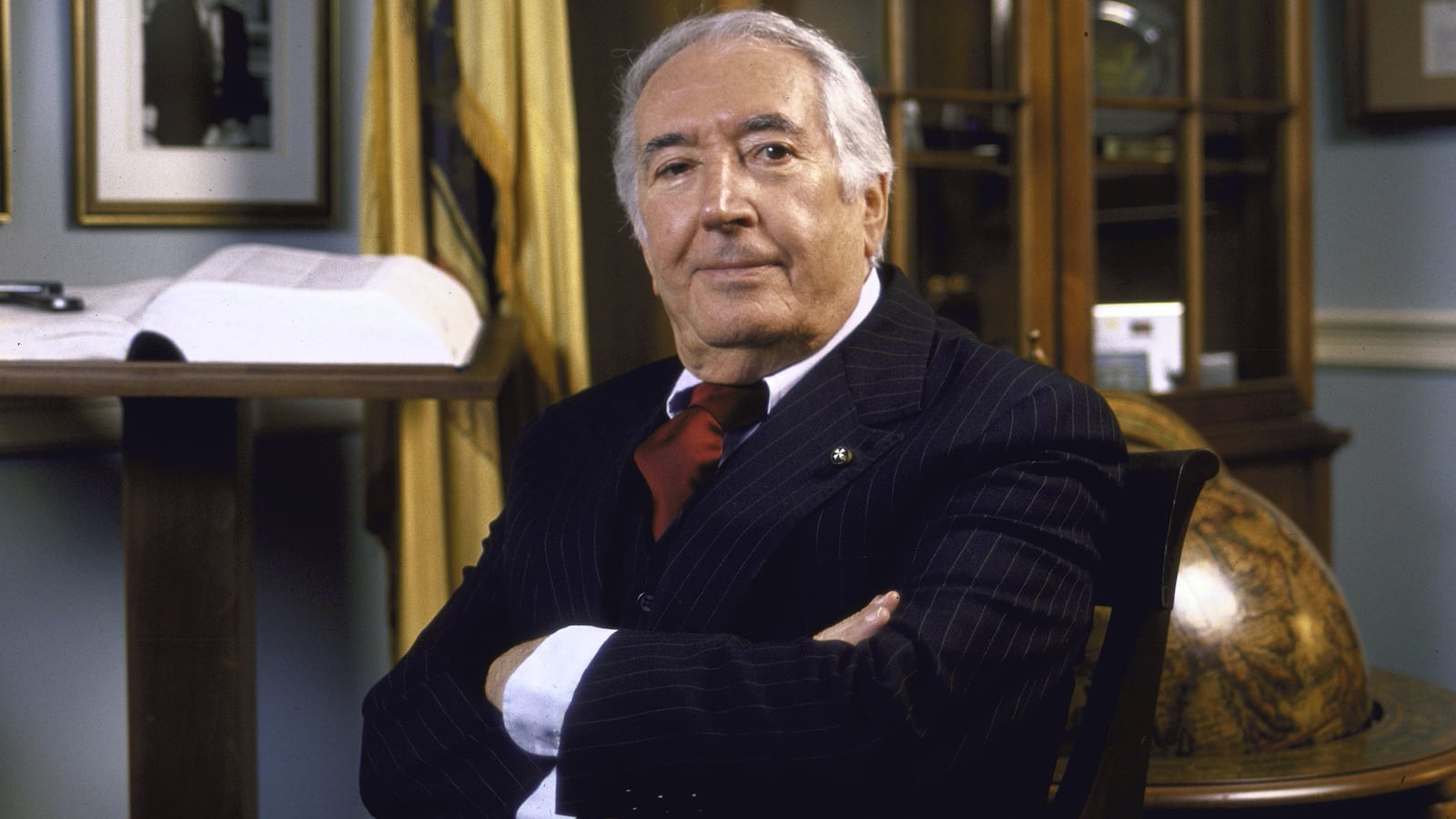Even as the House Judiciary Committee marches slowly toward the impeachment of Donald J. Trump, the ghosts of impeachments past stand to haunt chair Jerrold Nadler. One specter is the impeachment of Bill Clinton, which left the Republican Party in worse shape than Monica Lewinsky’s DNA-stained blue dress. The other is the apparition of the late Peter Rodino, a New Jersey Democrat and former House Judiciary Committee chairman who helped drive Richard Nixon from office almost 45 years ago.
As Nick Fish, a current Portland city commissioner and son of the late Hamilton Fish, Jr., a Republican member of the Judiciary Committee who voted to impeach Nixon, told The Daily Beast, that investigation set the “gold standard” for future impeachment efforts. It’s a standard the committee must live up to now in a country where many Americans still give Trump the benefit of the doubt but aren’t ready to turn the page without learning more.
Cancelled checks evidencing payoffs to Stormy Daniels—and payoffs to fixer Michael Cohen for paying her off that continued after Trump arrived in the Oval Office—have not closed the deal. By better than three-to-two, voters oppose commencing impeachment proceedings against the president. Yet by an almost identical margin, the public believes that Congress should continue to investigate “Michael Cohen’s claims about President Trump’s unethical and illegal behavior.”
Likewise, a clear majority of Americans, 64-24, is convinced that Trump committed crimes before he took the oath of office. But it is almost evenly split on whether Trump’s crime spree continued after he had uttered “so help me God” from the Capitol’s steps on a raw January afternoon.
For the moment, Nadler’s impeachment operation is viewed as partisan—even David Axelrod, Barack Obama’s former strategist, is fretting over the committee’s path. When the committee announced Tuesday that it had transmitted document requests to more than 80 individuals and entities, it simultaneously conveyed seriousness and resembled a brushback pitch.
In a word, there is little doubt that Democrats have their ducks lined up in row. Nadler is not looking like Devin Nunes on the House Intelligence Committee or Inspector Clouseau in The Pink Panther. Actual competence is a given, as Elijah Cummings and the Democrats displayed at the Cohen hearing.
More precisely, the question is whether Nadler will emerge as another Javert, with Trump striking enough Americans as Jean Valjean, a guy who already paid enough of a price for swiping bread to feed his sister’s miserable children. As if.
Unlike the Nixon impeachment inquiry, the current impeachment drive did not commence against the backdrop of identifiable events that took place after Nixon was elected, or which resonated beyond the partisan divide. Here, there was no Watergate break-in or Saturday Night Massacre. Instead, impeachment feels like a cumulative punishment for “modern presidential,” Trump’s ceaseless effort to define deviancy, and decency, down.
When collusion began and ended, if ever, has morphed into a movable goal post of recrimination and conspiracy theories. There may never have been a pee-tape, but the nexus between Russia and Trump was more than simply casual and isolated. Paul Manafort, a Trump campaign manager, has already been sentenced to 47 months in prison on tax and bank fraud charges with another round of sentencing looming. The only reason Javanka even hold a security clearance is that dad effectively bought her one, and another for her husband—sort of how The Donald transferred from Fordham to Penn, and how Charlie Kushner shoehorned Jared into Harvard.
As for the firing of James Comey, he was a member of the executive branch, and his departure led to the appointment of Robert Mueller as special counsel. Unlike Archibald Cox—the first special counsel to investigate Nixon—Mueller has kept his job, despite Trump’s tantrums and tweet storms.
Like the Judiciary Committee’s present document demands, Nixon’s impeachment appeared hyper-partisan as well early on. In 1972, Nixon had scored reelection in a landslide. The most persistent calls for impeachment originated from the American Civil Liberties Union and Democratic firebrands like Robert Drinan, a pro-choice Jesuit priest who taught law at Georgetown, and Elizabeth Holtzman, a freshman congresswoman who represented a neighborhood in Brooklyn that adjoins Nadler’s present district. As Tip O’Neill, the former House Speaker and another Irish pol, reminisced, “Morally, Drinan had a good case. But politically, he damn near blew it.”
Like Nadler, Rodino did not kick off his quest with a wealth of bipartisan support. Rather, a straight party-line vote defined the scope of the committee’s initial subpoena power. Yet Rodino early took steps that made bipartisan impeachment potentially attainable, and helped the country get behind the committee’s work.
For starters, Rodino did not task the impeachment investigation to the committee’s usual attorneys. Instead, he tapped John Doar as lead lawyer. Doar was a Republican and civil rights advocate who had served in both the Kennedy and Johnson administrations. In turn, Doar worked seamlessly with Albert Jenner, the Republicans’ counsel of choice, a name partner at a still-prominent Chicago law firm.
On top of that, Rodino’s committee did the initial heavy lifting behind closed doors, with a committee staff including the likes of Hillary Rodham and William Weld. They gathered facts, and at the outset defined what actually constituted an impeachable offense. Unlike the Clinton impeachment, the committee did not reflexively embrace the judgment of an overtly partisan independent counsel, Ken Starr. They gave thought to the materials and information they released.
As Rodino described things in the aftermath of Clinton’s impeachment: “In the Nixon case, the House Democratic leadership maintained a hands-off approach, allowing the Judiciary Committee to pursue an independent inquiry… John Doar, the majority counsel, and the staff were instructed to make no inference or partisan statements… In the Clinton case, in contrast, both Mr. Starr and the majority counsel… were unabashed prosecutors of the President.”
Rodino’s steps yielded dividends within months. On February 26, 1974, the House voted 410-4 to back a full-blown impeachment investigation. The operative resolution, H. Res. 803, “authorized and directed” the committee to “investigate fully and completely whether sufficient grounds exist for the House of Representatives to exercise its constitutional power to impeach Richard M. Nixon, President of the United States of America.” It also gave Rodino, and Michigan’s Edward Hutchinson, the committee’s ranking Republican, the power to unilaterally issue subpoenas.
When it came time to drafting, Rodino looked to the committee’s Republicans for input. In high school at the time, the younger Fish recalled how Rodino reached out to his father and to other Republicans like Tom Railsback of Illinois, Caldwell Butler of Virginia, and to Walter Flowers, a Southern Democrat, to craft the actual terms of the articles of impeachment, the documents that would charge Nixon with “high crimes and misdemeanors”.
Gazing back, Fish noted that Rodino possessed a “keen awareness” of how he would be viewed by history. “Legitimacy” mattered, according to Fish. Where “Father Drinan was passionate, Rodino was strategic.” Drinan also became personal friends of Fish’s parents.
In the end, the committee’s voted to impeach on the grounds of obstruction of justice, abuse of power, and contempt of congress. Each article of impeachment adopted by the committee had at least two Republican supporters and even as many as seven. Lawrence Hogan, a Maryland Republican and father of Maryland’s current governor, voted in favor of each count adopted by the committee.
According to Jack Pitney, a professor of politics at Claremont McKenna College and a former senior researcher at the Republican National Committee, “the Judiciary Committee kept its focus on obstruction of justice and abuse of power.” At the same time, “it wisely rejected proposed articles of impeachment on tax evasion and the bombing of Cambodia.”
In Pitney’s view, the committee “stuck to matters that Americans would regard as impeachable offenses, not purely personal issues or disagreements about policy.” After the committee’s votes were done, Rodino recalled that he returned to his office, ignored reporters and staff alike, and called his wife. When she answered, Rodino wrote in The New York Times, he “broke down and cried.”
America should have no reason to expect Nadler to shed a tear when the impeachment process ends, however it ends. With an overwhelming Democratic majority on the committee, the initial mechanics of impeachment should be relatively simple. Yet at this time of national divide, the Congress as a whole would do well to strive for a modicum of equanimity and dignity. Sometimes, how you play the game actually matters. This is definitely one of them.







